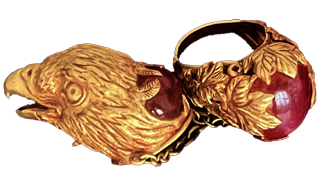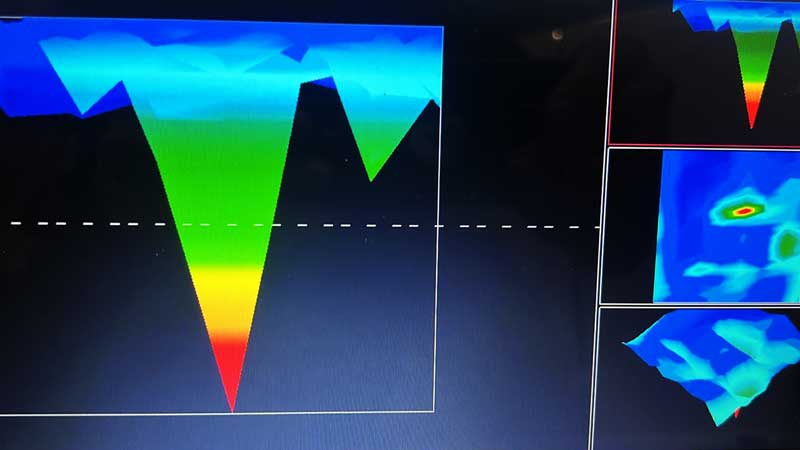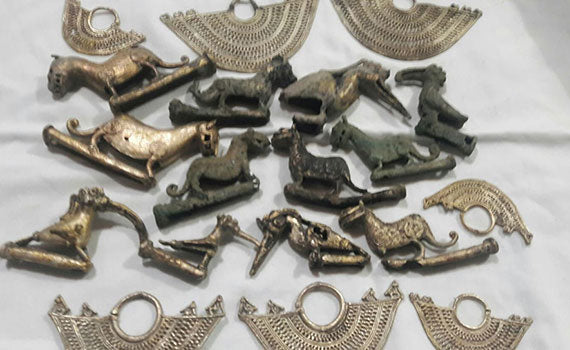المجوهرات الذهبية التي عُثر عليها مع تطور OKM في الشرق الأدنى

تم اكتشافها مع
OKM Evolution (2010-2017)
العمق: 1.8 m (5.7 ft)
المنطقة: Iran
نحن ممتنون للغاية للسماح لنا بمشاركة هذا الاكتشاف الاستثنائي ونتقدم بتهانينا القلبية للباحث عن الكنز. احتراماً لموقع الدفن، الذي يقع داخل مقبرة قديمة، لم يتم التقاط أي صور فوتوغرافية للموقع. وبدلاً من ذلك، قدم المكتشف صوراً ضوئية مفصلة تم إنشاؤها باستخدام برنامج الكشف Visualizer 3D بالإضافة إلى صور لقطعة المجوهرات الرائعة التي تم اكتشافها داخل التابوت الحجري.
لا يمكن لأحد أن يروي هذه القصة أفضل من صائد الكنوز نفسه. لذلك نسمح له بسرد اكتشافه المذهل بكلماته الخاصة.
صائد الكنوز الهاوي يكتشف مجوهرات قديمة
"أمارس هواية البحث عن الكنوز كهواية منذ أكثر من عام، وهذا هو أول اكتشاف لي جعلني عاجزاً عن الكلام.
كنت أعرف أن المنطقة كانت مقبرة قديمة تعود إلى ما قبل الإسلام. لم تكن القبور طويلة ولم تكن أي منها متجهة نحو القبلة كما هي القبور الإسلامية. ولأنني كنت أعلم أن الحضارات القديمة غالبًا ما كانت تدفن موتاها بقطع أثرية جميلة، بدأت بمسح الموقع".


"عندما كشفت عملية المسح عن إشارة إيجابية، أعدت مسح المنطقة بخطوط مسح رأسية أكثر دقة وإحكامًا. وأكدت بوضوح وجود جسم معدني تحت السطح."
"بعد ليلتين من الحفر، وصلت إلى عمق 150 سم، أو 4.9 قدم. تحول الطين إلى مادة تشبه الرمل، وظهر تحته حجر لا يشبه أي شيء آخر في المنطقة."
"بعد إزالة التربة من حوله، كشف الجسم عن نفسه كغطاء أبيض مستطيل الشكل، طوله 160 سم تقريبًا. كان غطاء تابوت حجري. رفعت الغطاء الثقيل...".
ماذا يوجد داخل التابوت الحجري؟
"في الداخل، رأيت شظايا من العظام البشرية، ورمالاً سوداء ذات ملمس زيتي، ورائحة قوية تنبعث من الداخل.
وبينما كنت أواصل الحفر، ظهرت عدة أواني فخارية. كانت كل واحدة منها تحتوي على نفس المادة الرملية التي تتفتت إلى غبار عند أدنى لمسة. غير أن أحد الأواني كان موضوعاً رأساً على عقب خلف حجر."
الكشف عن القطعة الأثرية
"أزلت الحجر واستكشفت الإناء. ذابت معظم المواد الموجودة بداخله إلى رمال على الفور. ولكن بعد ذلك شعرت بجسم أكثر كثافة. أزلت الرمال ورأيته: هذه القطعة الذهبية الجميلة من المجوهرات."
إلقاء نظرة فاحصة على القطعة المكتشفة
بعد التنظيف الدقيق، كشفت القطعة الأثرية عن حرفية معقدة. يبدو أنها حلية يدوية متعددة الأجزاء تتألف من عدة عناصر تشبه الحلقة متصلة بسلاسل دقيقة. كانت الأحجار الحمراء الكبيرة مرصعة في القطع الزخرفية الرئيسية. ولا يمكن إلا لخبير في الموقع أن يحدد ما إذا كانت هذه الأحجار شبه كريمة أو أحجاراً كريمة ثمينة مثل الياقوت أو التورمالين.


الفنون والحرف اليدوية في إيران ما قبل الإسلام
- الإمبراطورية الفارسية القديمة، المعروفة أيضاً باسم الإمبراطورية الأخمينية، من القرن السادس إلى القرن الرابع قبل الميلاد
- الإمبراطورية الفارسية الجديدة، المعروفة باسم الإمبراطورية الساسانية، من القرن الثالث إلى القرن السابع الميلادي
في إيران ما قبل الإسلام، كانت المجوهرات في إيران قبل الإسلام رمزاً للمرتبة الاجتماعية والمكانة الشخصية. وشاع الجمع بين الذهب والفضة والنحاس مع اللؤلؤ والأحجار الكريمة لصنع حلي متقنة للأيدي والشعر والملابس والأشياء الاحتفالية. وبلغت ذروة الحرفية في صناعة الذهب في عهد الإمبراطورية الساسانية، حيث أصبحت الحلي الفاخرة عنصراً أساسياً في التعبير الثقافي.
ومع ظهور العصر الإسلامي، تحولت الأنماط الفنية نحو التصاميم الهندسية والأشكال الزخرفية. وعلى الرغم من تقييد استخدام المعادن الثمينة، إلا أن روح الحرفية استمرت في صناعة الفخار والتطريز ونسج السجاد التي حملت أناقة التقاليد السابقة.
الأحجار الكريمة في إيران
لطالما كانت الأحجار الكريمة عزيزة في إيران منذ آلاف السنين. فعلى مرّ التاريخ، كان الملوك والنبلاء يتزيّنون بالأحجار الكريمة المرصعة بالذهب والفضة. وبالإضافة إلى الأحجار الكريمة الكلاسيكية، استخدم الحرفيون اللؤلؤ والصدف والمرجان والعنبر لصنع قطع زخرفية.
وتشمل الأحجار الكريمة الشائعة في إيران الزمرد والعقيق والفيروز واليشم والجمشت. وتظهر هذه المعادن بشكل متكرر في القلائد والخواتم والأساور، وغالباً ما تكون مرصعة في معادن ثمينة ذات أنماط مزخرفة.

الياقوت أو التورمالين
لا يمكن تحديد ما إذا كانت الأحجار الموجودة في المجوهرات من الياقوت أو التورمالين الأحمر، الذي يُطلق عليه أيضاً الروبلايت، إلا من خلال فحص متخصص. يتكون الياقوت من أكسيد الألومنيوم البلوري وينتمي إلى مجموعة معدنية مختلفة عن التورمالين.
يُظهر كلا الحجرين انكسارًا ثنائي الانكسار، لكن الروبليت يُظهر تباينًا أقوى في اللون. وعند النظر إليه من زوايا مختلفة، يتغير لون الروبليت بين الأحمر الداكن والأرجواني أو الوردي النابض بالحياة. وتحت الضوء المتغير، غالباً ما يُظهر الروبليت توهجاً وردياً ناعماً لا يظهر في الياقوت بنفس الحدة.
الأسئلة المتداولة
أين اكتُشفت المجوهرات؟
عُثر على القطعة الأثرية داخل تابوت حجري يقع في مقبرة قديمة تعود إلى ما قبل الإسلام. واحتراماً لموقع الدفن، لم يتم التقاط أي صور للموقع.
ما هو الكاشف الذي تم استخدامه لتحديد موقع القطعة الأثرية؟
استخدم الباحث عن الكنز ماسحًا أرضيًا ثلاثي الأبعاد من OKM، إلى جانب برنامج Visualizer 3D، لتحليل الشذوذات تحت الأرض.
ما مدى العمق الذي دُفنت فيه القطعة الأثرية؟
تم اكتشاف المجوهرات على عمق 150 سم تقريباً أو 4.9 قدم.
ما الذي تم العثور عليه بالضبط؟
قطعة مجوهرات ذهبية متعددة الأجزاء مع عناصر خاتم متصلة بسلاسل وأحجار زخرفية حمراء، ربما ياقوت أو روبيليت.
ما هو السياق التاريخي لهذه المجوهرات؟
استناداً إلى الطراز والحرفية، من المرجح أن القطعة تعود إلى فترة ما قبل الإسلام في إيران، وهي فترة كان الذهب والأحجار الكريمة فيها ترمز إلى المكانة الاجتماعية العالية.
ما الذي يرمز إليه النسر في إيران القديمة؟
كان النسر يمثل السلطة الملكية، وغالباً ما ارتبط بالملوك والعائلات النبيلة خلال العصر الأخميني والساساني.
هل يمكن التعرف على الأحجار الحمراء من الصور؟
لا، لا. لا يمكن تحديد ما إذا كانت الأحجار الحمراء من الياقوت أو التورمالين أو أي معدن آخر إلا من خلال فحص الأحجار الكريمة شخصياً.
Get Rewarded for Your Treasure Finds
You have also made discoveries and detected amazing artifacts and would like to share them (anonymously)? We look forward to reading and publishing your success stories!


